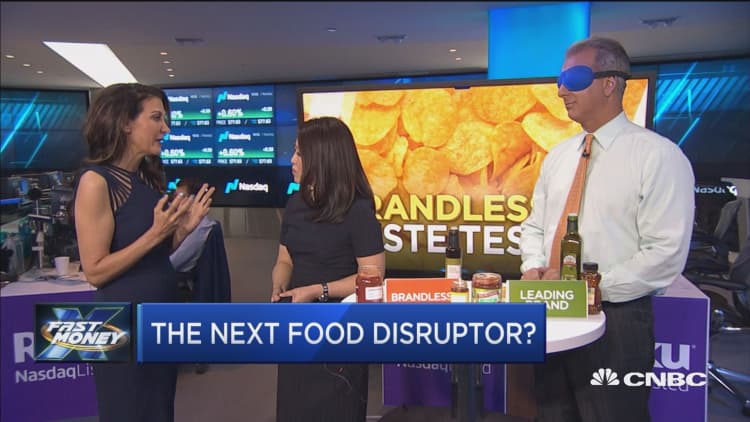Brandless wants to do to beauty what it's already done to crunchy peanut butter, tree-free toilet paper and porcelain mugs.
"The typical family around the country is spending a lot of money on [beauty items]," co-founder Ido Leffler told CNBC. "If we can help alleviate the cost ... I feel like we can make that easier for people."
Founded by Tina Sharkey, who has worked at Johnson & Johnson, and Leffler, who co-founded beauty brand Yes To, Brandless sells everyday essentials, directly to consumers, all at $3 a pop. That goes for Brandless' organic snacks, coffee, and an array of household items and office supplies.
Now, Brandless hopes to tap into a booming beauty market with a selection of $3 items including lotion, mouthwash, shampoo and facial cleanser.
"For me this is personal ... that everyone can get natural and organic, clean beauty products at a value proposition that makes sense for everyone," Leffler said. He explained that customers were increasingly requesting beauty products on the site that Brandless didn't have, hence the push to enter the market.
Today, Brandless' value proposition stands in stark contrast to many consumer packaged goods companies or other beauty retailers. In tacking on excess fees, many businesses look for higher margins in the beauty market, according to Leffler.
Investors have shown interest in Brandless' desire to be different, too. Before its launch this summer, Brandless had already raised more than $50 million, spread over three rounds of funding.
The e-retailer was incubated by Sherpa Capital, where co-founder Sharkey was once a venture partner. And the e-commerce business received other seed funding from California-based Cowboy Ventures and Slow Ventures.
Without partnering with other retailers, Brandless is approaching selling more than 300 SKUs on its website, and growing.
A slew of e-commerce-based businesses has found similar rapid growth in 2017, such as mattress company Casper, which now has a partnership with Target, and Jet.com, which was acquired by big-box giant Wal-Mart.
Eyeglass retailer Warby Parker and men's clothing company Bonobos started online but have since been opening up physical stores. Untuckit and Allbirds offer other examples of the same strategy.
For Brandless, as it adds more items to its website, the company will bypass certain distributor costs, sales trade costs and other fees associated with retail distribution. In choosing to only sell its products via Brandless.com, the company said it aims to create more intimate relationships with customers.
"There's no shortage of new opportunities," Leffler said ahead of the beauty products launch.
Brandless also had a goal of creating a "cleaner" beauty line, and "banned" more than 400 potentially harmful ingredients from its production process. It's a bold stance that some restaurant chains, like Panera Bread, have taken in advocating for safer or organic additives. And Leffler and Sharkey agree that consumers should be thinking about what they're putting on their bodies, as much as they think about the food they eat.
A few of Brandless' beauty items are entirely fragrance-free. Others with a seasonal twist, like Brandless' maple ginger-scented hand soap, will rotate through the website.
The entire beauty line is now available for purchase on the website.
WATCH: Could this online grocery store be the next food disruptor?



